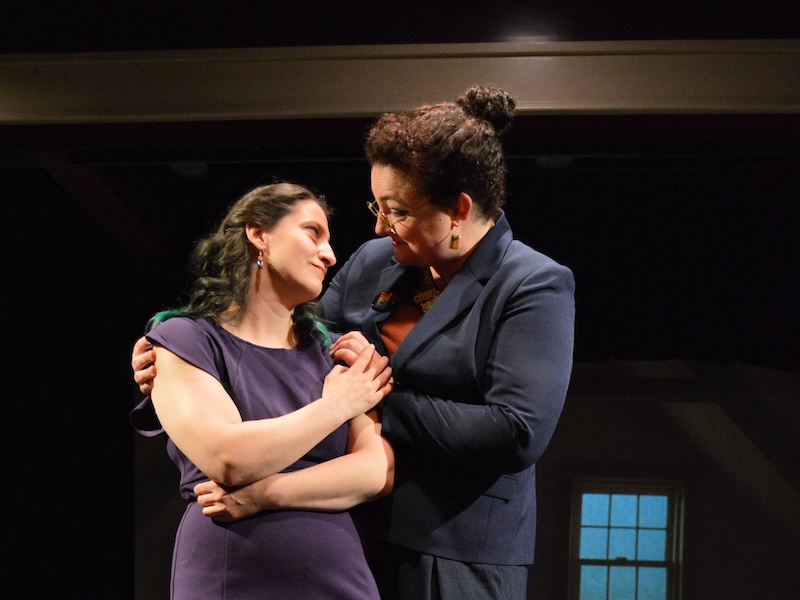What does it take to start a revolution? That is the central question posed in Bull in a China Shop. Inspired by the real love letters between Mary Woolley and Jeanette Marks from 1899 to 1937, this play by Bryna Turner takes a deep dive into the ambitions and trials of two queer women. As the actors and director Vanessa Markowitz highlight, this history of revolution wrapped in a love story has a way of repeating itself.
Bull in a China Shop covers the life and love of Mary Woolley and Jeanette Marks from the turn of the 19th century through World War I, right up to the beginning of World War II. Woolley is the newly instated president of an old Massachusetts seminary-turned-university, and Marks is a new English professor. Both are set on revolutionizing women’s education and empowerment, even if it costs them their relationship. In 24 breakneck scenes, these queer lovers and their friends explore relationships, power, revolution, and the risks women take when they choose to lead.

The production team took advantage of the small space provided by the Arts Barn, utilizing it to its full potential by using the theater door that the audience enters through as the entrance to the characters’ homes, and employing the audience seating much like a college lecture hall, where professors can wander through the aisles to better interact with their students. The sets, designed by Jeffery Asjes, were minimal and provided only what was necessary to evoke the feeling of furnished spaces. Projections, created by Brian Markowitz, further established the scenes of a university campus. One of the added benefits of these minimal sets and projections is that they allow the actresses to fill the rest of the space with their presence.
All five actresses in this all-women cast brought energy and passion to the stage, further highlighting the themes of female empowerment and revolution. Cassandra Redding delivered a performance that was both boisterous and vulnerable as Mary Woolley, illustrating how a rise to power also brings a rise in conflict, especially for a woman. Brittany Trexler’s ability to embody both the brash lover and passionate teacher that is Jeanette Marks was captivating and showcased the growth of her character. Jennifer Flores plays the naïve student Pearl with joy and openness that reflects her character’s voice, and her monologue conveyed all the radical emotions and tribulations of first love — or just love at all. Briana Craig’s character, Felicity, often supports the other characters in their endeavors while maintaining her own values and commanding a presence on stage. Rachel Schlaff portrays the “traditional” Dean Welsh with poise and elegance that reveal the conflicted nature of her character while keeping her reserved demeanor. All the actresses did their homework and found ways to dig into the emotional turmoil of love and power, as well as the struggles of wanting change and stability all at once.
Director Vanessa Markowitz notes that to portray the timelessness of the themes and stories explored, they chose “to incorporate contemporary elements of design in the costumes and props — in much the same way Turner utilizes modern language…” While some of these modern touches were a bit jarring, overall they did work to exemplify the repetition of history and the necessity of learning from the past. The costumes evolved as the years stretched on, moving from traditional late-1800s women’s wear to more casual dresses and skirts, and the addition of modern rainbow accessories such as bows or earrings conveyed allyship to the LGBTQ+ community that stretches beyond the characters.

There is never a “right time” for a revolution. At the beginning of this play, the characters are met with backlash and claims that their ideas are too radical while “The Great War” rages on. By the end of the play, Woolley is forced to resign due to concerns that her revolutionary ideas are too much to handle as the world prepares for World War II. Despite this, the women continue to fight and share their revolutionary ideas in hopes that something good will come from it, even if it’s much, much later. The revolutionary spark and passion of the women in Bull in a China Shop serve as a much-needed reminder that our history cannot be ignored — it is a mirror of our lives now, a warning of what happens if we resign to silence, and a call to action to never back down from a revolution.
Running Time: 90 minutes with no intermission.
Bull in a China Shop plays through June 22, 2025 (Friday and Saturday at 8 PM and Sunday at 2 PM), presented by Arts on the Green in partnership with The Montgomery Playhouse performing at the Arts Barn, 311 Kent Square Road, Gaithersburg, MD. For tickets ($23; $21, students 15–21), buy them at the door or purchase them online. Online ticket sales end two hours prior to the performance. Tickets may also be purchased in person at the Arts Barn box office or by calling 301-258-6394.
Recommended for ages 15 and up. (Contains adult language and intimacy.)
Bull in a China Shop
By Bryna Turner
Directed by Vanessa Markowitzv
